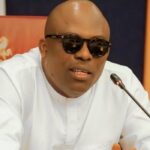While referring to the responses by the Bola Ahmed Tinubu presidency to contain the ongoing nationwide protests, as the tell-tale signs of a stampede, may not be very charitable, the administration had not acted otherwise. Such a situation alone provides proof that all along it was groping in the dark and unsure of what it was doing. Hence, thanks to the protests for at least resetting the thinking of the administration, whereby it must also have come to terms with the reality that several of its policy positions and governance processes were clearly unhelpful.
The most prominent of these happen to be two. The first was the withdrawal of fuel subsidy without a credible back up plan to cushion the effects of such a measure. The second one was the complement of efforts aimed at harmonising the exchange rates of the Naira in both the official and parallel markets.
Without doubt, both policy measures which had seemed gilt-edged for the administration – rather than achieving their designated objectives, simply manifested and exposed inherent weaknesses in the economy, which played out into the street rage across the country. For while the fuel subsidy removal escalated prices of essential commodities including basic food stuff, the second one made imports more expensive. With both dispensations occurring in an import dependent economy with a compromised domestic productive capacity as Nigeria’s, the outcome was not to be other than the syndrome of widespread shortages of food and other essentials.
In its groping disposition, the government had to suffer among other negatives, the humbling experience of adopting knee-jerk measures under duress, in order to save its neck. Typical instances were first when it hurriedly and literally stampeded organised labour to swallow a new minimum wage of N70,000.00 per month, instead of the N250,000.00 which labour had insisted on as its last point of free bargain. Other measures include the pedestrian act of direct purchase and distribution of rice to the various states to make food cheaper.
- The ‘forgotten war’ in Sudan gets more devastating
- Prof Salisu Shehu’s pointblank truth from the pulpit
However, going further from here brings into focus the question of what lessons have been learnt by both the government and Nigerians as well. For as evidence has shown, while these policy measures and many others may have looked rosy on paper, in the real world structure of the Nigerian economy, they were flawed in conception and execution, for the simple fact that they were bereft of contingency measures, if something went wrong. For while the policies may have worked in other parts of the world, in Nigeria things went wrong, and they simply served as the precursors of failure of governance, with protests that are telling Bola Tinubu in clear terms, ‘Carry us along Mr President’.
In the present dispensation, the situation conveys a rather frightful scenario of poor appreciation of the structural underpinning of the Nigerian economy by the administration just as it has been with previous administrations. It would seem that successive Nigerian leaders including the present Bola Tinubu dispensation come into office without the fundamental appreciation of Nigeria’s high incidence of poverty. With over 40% of Nigerians living below the poverty line and over 63% trapped in multi-dimensional poverty, the policy direction of the administration failed to appreciate such pallid but nevertheless, real time statistics of the country. Hence the incidence of wide spread system meltdown, as is currently raging across the country and in respect of which the protests were spawned in the first place.
With respect to the protests, while with several maneuvers by the president’s ‘fire brigade’ approach, the initial fury with which the scare hit the country’s public domain may have abated, it may be tempting for the government to consider the problem over. However, such will be the height of presumption and misjudgment of Nigerians as well as their grouses against the administration.
In the light of this dip in the country’s fortunes which the protests represent, What Nigerians want from the Tinubu administration now is a new, realistic focus on solving the challenges it inherited from past administrations, with the ongoing scarcity of goods and services as the centre piece of the new strategy. For as any appraisal of the causes of the protests cited by various protesters easily shows, the common thread among them is that government policies were not only suffocating the populace but have led to the avoidable deaths of several innocent Nigerians. The government’s approach has been the denial of the structural incontinence of the economy which is the state of massive poverty across the entire country even before its advent.
Yet, to what extent will the situation change is another question, as the mindset behind the government’s responses remains the sustenance of the status quo, whereby the powered class may not be ready to relinquish any of its perquisites of office and position. This also serves the moot point that beyond the palliatives and the knee-jerk relief options which were offered under duress, nothing more substantial may come from the administration.
For one, there is reasonable doubt that the president may allow any meaningful changes in his cabinet and policy orientation. And if such be the case, Nigerians should be ready, for further suffering in silence, as another protest may be long in coming, even as the hardship continues.
Whoever is in doubt should simply study the body language of Senate President Godswill Akpabio, Special Adviser to the President on Media (better put as Chief of propaganda) Bayo Onanuga, and other elements in the Bola Tinubu personality cult.

 Join Daily Trust WhatsApp Community For Quick Access To News and Happenings Around You.
Join Daily Trust WhatsApp Community For Quick Access To News and Happenings Around You.


